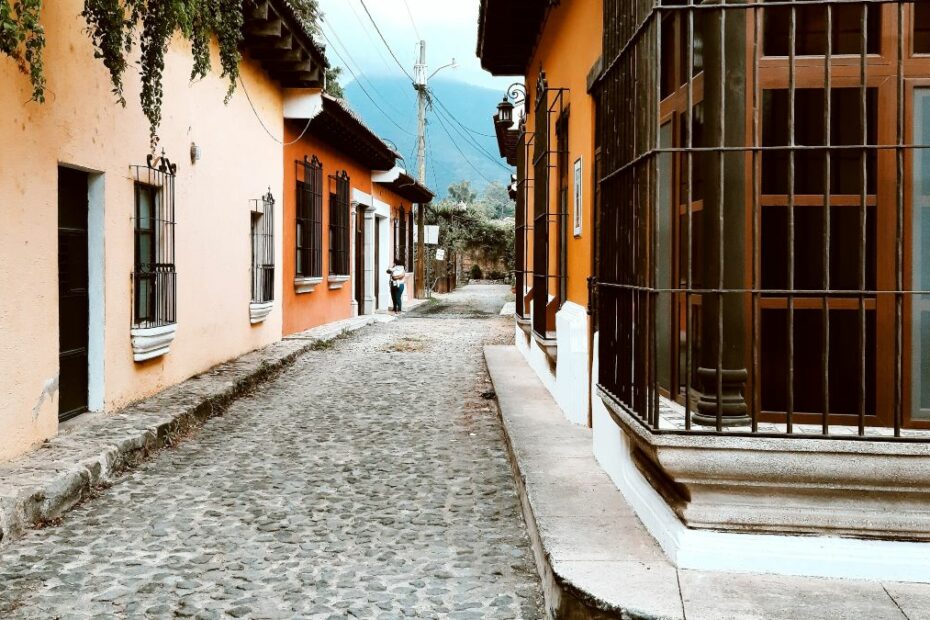
Former Antigua real estate agent Jake Stamp talks about buying property in Guatemala, with an emphasis on Antigua. It’s not rocket science, but there are some need-to-knows when it comes to Guatemala real estate.
The first question every realtor in Guatemala gets from a foreigner is, “Is buying property in Guatemala feasible?” And the next question is usually, “Should I buy property in Guatemala?”
The answer to both questions is simple: Yes.
Founded by the Spanish in 1543, Antigua was the capital of the Captaincy General of Guatemala, a region that stretched from modern Chiapas in Mexico all the way down to Panama.
In 1773, an earthquake devastated the city which then had an estimated population of around 60,000. After the earthquake, the Spanish built a new capital two valleys over, where the modern capital of Guatemala City now stands. Today Antigua’s population is around 35,000, a far cry from its 18th-century heyday.
Due to extraordinary preservation efforts, Antigua is now one of the best-preserved colonial cities in Latin America and a UNESCO World Heritage Site. The roads are all cobblestoned, and the preservation efforts keep the colonial vibe intact.
View this post on InstagramWith the center of town measuring only about seven blocks by nine, real estate is at a premium in Antigua.
Most houses are in the traditional Spanish “hacienda” style, comprising a large wall to the street side of the house and behind, a courtyard surrounded by shaded porticoes and rooms opening into the center. Given the year-round mild climate, outdoor/indoor living is the norm. Often large living and dining rooms have double doors that open to create a combination space allowing for fresh air to enter.
The casual visitor can walk down a street in Antigua and never know what lies behind the walls fronting the calles and avenidas.
A dented scratched door set into a cracked and peeling wall can open to a colonial Xanadu of fountains, tropical flowers erupting with multi-hued blossoms, and a home featuring carved wooden pillars and exquisite furniture.
Sometimes an imposing mahogany set of double doors twelve feet high inlaid with brass accents will open to reveal a concrete pad with a stucco house painted in a fluorescent green that exists nowhere in the natural world.
View this post on InstagramForeigners are free to own property in Guatemala outright. Many form a Sociedad Anonima (S.A.) or corporation to own their property. Having an S.A. opens doors to the Guatemalan banking system, and if one wishes to start a business of some sort, is about the only way for a foreigner to do so.
The only variable to this is for property facing a body of water. That’s ANY body of water. River, ocean, lake, you name it. A governmental body known by the acronym OCRET administers these properties.
When you buy land administered through OCRET, you’re leasing from them, but you can buy or sell it without reservations. The only contingency is a lease fee paid every year to OCRET. Most of the time, this fee is less than US$100 per year, depending on the size of the property. Payment is compulsory, and failure to do so can mean the state confiscating the property.
A buyer would be wise to have their lawyer find out the current status of OCRET payments before buying any land under this jurisdiction.
This raises the next point.
View this post on InstagramThere are certain people involved in the Guatemala real estate industry that may not have the strictest sense of morality. I recommend any potential buyer to hire a reputable lawyer to oversee all aspects of a real estate transaction. Also, it is imperative to work with an agent you trust, and you feel comfortable working with.
As in certain European countries, there is no multiple listing-service in Guatemala. Sellers list their house with an agency, and that same agency connects them with a buyer, and vice versa. Sometimes a buyer or seller has their own agent, but this is much rarer than in the US or Canada, for example.
So it’s always best to find a reputable agent who has your interests in mind, and those of the people on the other side of the deal. It is almost always better to work with a larger, more established agency than someone who sells houses from the back of a motorcycle.
All that aside, buying a house in Guatemala for retirement, living, investment, or vacation purposes isn’t overly complicated. As with anything worth doing, you need time and patience, but the rewards justify the potential hurdles.
For a fraction of the price of a house in many parts of North America or Europe, one can get a beautiful place in the Land of Eternal Spring. Costs of living are lower, inexpensive medical care with qualified multi-lingual practitioners is the norm, and the lifestyle is second to none.